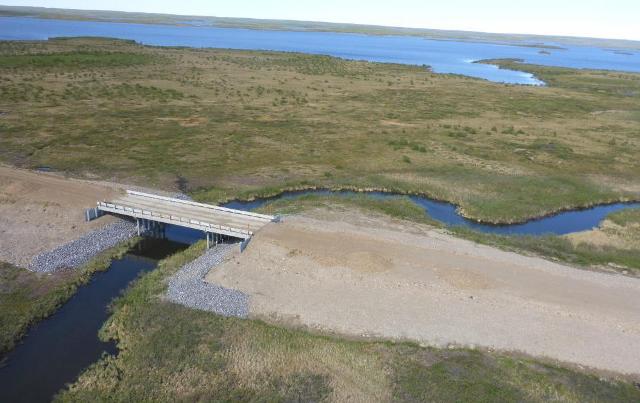
Canada’s first all-season road to Arctic coast opens in Northwest Territories
by Bob Weber, The Canadian Press

The remote 120-kilometre gravel road connects Inuvik with the small Arctic Ocean hamlet of Tuktoyaktuk across a rolling landscape of tundra and frigid lakes

The new highway crosses 120 km of rivers and tundra previously only traversable in winter using ice roads. PHOTO: Government of Northwest Territories
TUKTOYAKTUK, N.W.T.—At 6 a.m. on Wednesday, in the arctic cold and darkness of the Mackenzie Delta, Darrel Nasogaluak will fire up his vehicle and head out on Canada’s newest and most exotic road trip.
Nasogaluak, mayor of the Northwest Territories hamlet of Tuktoyaktuk, will drive down 120 kilometres of brand-new, two-lane, all-weather gravel to Inuvik. Replacing a seasonal ice road, the new highway is the country’s first permanent link to its Arctic coast.
With apologies to Stan Rogers, travellers will now be able to grasp the hand of Franklin reaching for the Beaufort Sea from the heated comfort of their drivers’ seats.
“It’s something that’s been on the community’s want list for 40 years,” said Nasogaluak, who will make the early morning trip to join up with opening ceremonies in Inuvik.
After it’s done, he’ll join an official motorcade heading back up the road to Tuk. That’s where the real party begins—speeches, songs, fireworks and a lavish community feast with local favourites including caribou, reindeer, char, whale and muktuk.
The $300-million road will cross a rolling landscape of tundra and lakes with many stream crossings and bridges.
“I’ve travelled a lot of highways, but the scenery on this one is quite different,” said Nasogaluak, who’s already been out on the route on his ATV. “You come out of the forested areas out on to the tundra and you eventually reach the ocean.”
N.W.T. Infrastructure Minister Wally Schumann has driven half the road.
“When you come out of Inuvik, for about 20 kilometres you don’t realize how much you’re going uphill. The trees just get smaller and smaller and smaller and all of a sudden you’re on the top of a mountain and there’s no trees and you can see about 100 kilometres on both sides of the highway.
“It’s an amazing feeling.”
People first began talking about the project in the 1960s. Surveys began in 1974.
The Northwest Territories made the first proposal in 1998 and Ottawa granted $200 million in funding in 2009 after years of lobbying from the territory as well as aboriginal and business groups. Construction began in earnest in 2014.
It’s taken a while. But maybe that’s a good thing, said Nasogaluak.
“It’s given us an opportunity to prepare really well.”
The community has had many public discussions on the road’s potential impact, both social and environmental. And it’s getting ready for visitors.
A southern company has donated 2,000 cans of brightly coloured paint to spruce up the place.
The local bed and breakfast has added rooms. Tuk is developing RV parking sites and public facilities such as toilets.
It’s also estimated that a reliable route for supplies will reduce the cost of living in the Tuk by about $1.5 million a year. That’s the equivalent of $1,500 in savings for every man, woman and child in town.
The road is likely to boost economic activity in the area by reducing transportation costs, said Schumann. It’s an example of the kind of infrastructure the N.W.T. desperately needs.
“Our infrastructure deficit is horrendous,” said Schumann.
The Inuvik-Tuk road is only the start of the territory’s asks.
It’s been looking for an all-weather road from Yellowknife into the heart of the territory, where some of the richest mineral deposits anywhere in the world await, linking up to a port on Nunavut’s western coast. It would also like a road reaching up the Mackenzie Valley to open that region for tourism and development.
“Every dollar invested by the federal government into this type of infrastructure in the territories is not only going to benefit us, it’s going to benefit all Canadians,” Schumann said.
But for now, Inuvik-Tuk is cause enough for celebration, said Nasogaluak.
“Everywhere you go, somebody’s saying it’s two months, it’s one month, now we’re down to days. A lot of people are excited and we’re going to have quite a celebration.”